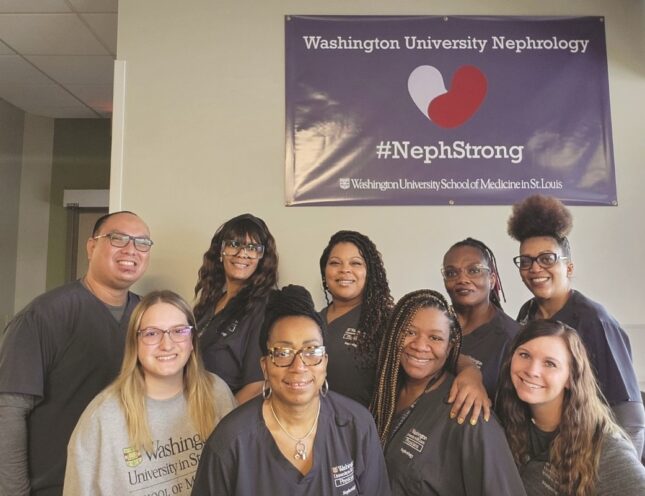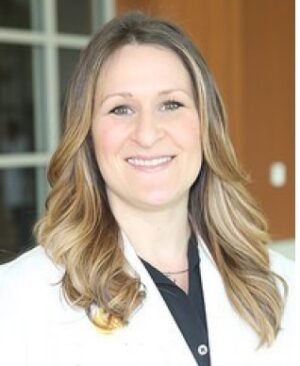
It was a happy homecoming for the North County Dialysis Center team in Florissant, MO, when they saw one of their patients, Christina Miles, come through the doors carrying her baby, Orlando Christopher Dean.
“I can’t believe how beautiful he is!” said Gena Hubbard, CCHT, a certified clinical hemodialysis technician, as she cooed over the baby with delight. “It’s like a miracle, a blessed miracle!”
Miles, diagnosed with juvenile diabetes when she was younger, was referred for dialysis when she was just a few months pregnant. “My kidneys failed drastically, and I had high blood pressure,” she said. “I was very worried. Even the doctors were telling me that they were worried about the pregnancy, too.”

The fears were justified because of the statistics: only one to seven percent of women on hemodialysis can get pregnant. For women on peritoneal dialysis, the rate is even lower. Developing kidney complications while pregnant puts both the mother and baby at risk. Live births are uncommon.
Thanks to the advancement of intense hemodialysis protocols and aggressive, multidisciplinary care, however, the number of live births among dialysis patients in recent years is rising. “I’ll be honest, yes, we were worried,” said Manasa Metireddy, MD, who along with Reena Gurung, MBBS, oversaw dialysis care for Miles. “We knew it was high risk and that we’d have to coordinate care between us, maternal fetal medicine and endocrinology.”
The entire team rallied behind Miles. She first was seen by Kelli King-Morris, MD, director of the Division of Nephrology’s recently opened Maternal Fetal Medicine Nephrology Clinic. At 22 weeks gestation, Drs. Gurung and Metireddy took over when Miles needed to go on dialysis.

“A major distinction in dialysis prescription during pregnancy is that, for the baby’s development, we try to achieve clearance closer to functioning kidneys through more frequent dialysis, which meant 5-6 times a week versus 3 times a week,” said Dr. Gurung. “This was no small feat for the patient, who had to juggle between various specialist appointments and make all of her dialysis appointments. We also had to monitor body weight and fluid volumes and increase the frequency of lab tests to make sure mother and baby were healthy.”
From the beginning of her dialysis journey, Miles said the team felt like family. “Everyone was welcoming, and I felt like I was in good hands,” she said.
Patrice Finnie, RN, Nurse Manager of Washington University’s Dialysis Center in Florissant, remembers the day before Miles arrived at the dialysis center. “When we were told we were going to care for a young lady who was pregnant, we were worried because of the high risk,” Finnie admits. “But we immediately told ourselves, WE are having a baby! We rallied around to support her and provide the care she needed. Christina came in five days a week for almost half a day each time, worked through transportation issues and her own doubts and fears and was amazing throughout.”
Gena Hubbard became Miles’ biggest champion and told her to keep the faith. “I told her this is rare to have a baby, and she knew it,” said Hubbard, “We told her to focus on what was important — to come to all of the dialysis treatments and to take care of herself. It’s a challenge by itself to be on dialysis and to add pregnancy to that, well, we just had to say prayers and help her when she was overwhelmed.”
Miles blood pressure ping-ponged like crazy throughout her pregnancy. At seven months gestation, with the risk of heart attack or stroke looming because of a sudden spike in her blood pressure, her obstetricians admitted her to the hospital and told her it was time. Instead of being born two days before Christmas, Orlando appeared on October 11, 2022. Soon after, texts began appearing on the phones of staff at the dialysis center. “We have a baby; we have a baby!” Cheers erupted as everyone celebrate the good news.
Miles had to remain in the hospital for a week after the birth of her first child. Orlando would remain in the neonatal intensive care unit at St. Louis Children’s Hospital for almost three months. Now, both are recovered and thriving. Miles, still on dialysis but down to three days a week, is grateful for her new extended family at the dialysis center.
“I really love them,” she said. “They prayed nonstop for me and my baby. They all said they’d be with me throughout my pregnancy, and they were. They said I could do it…and I did. And now I have my beautiful baby boy!”
See more about the Maternal Fetal Medical Nephrology Clinic here and read more about Christina and Orlando in the 2023 Spring Nephrology Update Newsletter.
On Twitter, follow Dr. Kelli King-Morris @TammiHorsfall and @WUNephrology; visit and “Like” us on Facebook.